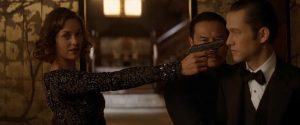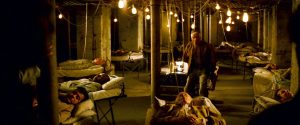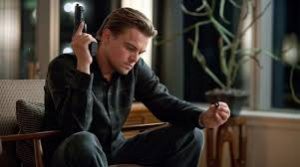
Inception: Carnival’s Worst Nightmare
Imagine a world where all rules are suspended. You can speak freely and behave as rashly as you wish. There are no societal pressures or roles to fill. The joker can essentially become the king and consequently, the king can become the peasant (English 117). Our social hierarchy is flipped upside down. “This alternative social space is characterised by freedom, equality, and abundance. It creates the chance for a new perspective and a new order of things” (Robinson). This type of setting where rules are suspended and societal roles are flipped is known as carnival. Now, upon hearing this you would think that carnival is a joyous time for everyone, right? Wrong. Living in a world where carnival is implemented daily will result in many detrimental effects. Carnival’s instability of rule breaking and social norms will destroy not only you as person, but also the rest of civilization.
Pop culture has promoted carnival through various forms of art. To the average participant, carnival may seem all fun and games, but it simply cannot exist for the entirety of one’s life without serious negative effects on one’s self. Therefore, we need to stop promoting carnival ideas through pop culture such as those present in Christopher Nolan’s 2010 hit movie, Inception.
Inception presents the dream state as a way for people to live in an alternate reality where rules are suspended. Dreaming allows people to enter a setting filled with carnival. This type of environment can defy rules of gravity and other laws of nature as pictured in the beginning of the movie. The main character, Cobb, recruits Ariadne, a college student majoring in architecture, for a chance to build the dream world.
The audience sees Ariadne flip the ground vertically so that gravity does not pull her and Cobb downwards. She is able to change the infrastructure on command and destroy anything she deems unneccessary to the dream, which is clearly not possible in the real world where gravity and magic do not exist. Ariadne is able to create from pure imagination anything she desires to see in her world. However, this comes with extreme risks. In this scene, the projections of Cobb’s subconscious start to realize that things are not normal. Cobb explains, “They sense the foreign nature of the dreamer. They attack like white blood cells fighting an infection.” Through this scene, it can be inferred that carnival is extremely dangerous to the participants. The more Ariadne messed with her world and included drastic changes to laws such as gravity that exist in reality, the more attention she drew to herself. Later in the movie when the same issue occurred in another dream with Ariadne, Cobb’s right hand man, Arthur, states that, “No one likes the idea of someone messing with their mind.” These instances can be translated to the fact that no one likes changing the rules. Even in this carnival-like setting, judgment from others cannot be escaped. Our culture generally claims to encourage diversity and individuality. Ideas such as promoting change and implementing new ways of living are goals that many people of society would push for. However, in both dreams, Ariadne’s creative behaviors are strongly rejected by society because they are so different from our natural laws. In the real world, if there is one person who disregards societal norms, it is natural for others to give them a look of disgust or even try to purge them from society. It is shown in Inception at the most extreme level where the projections ultimately kill Ariadne and Cobb so that they can return to a world where their laws and societal norms are respected again. 
Additionally, the dream state in Inception includes carnival’s idea of flipping the social hierarchy upside down. The man’s mind that Cobb and his team are trying to infiltrate is the heir to a multibillion dollar energy corporation. In real life, Fischer, the victim of Cobb’s inception mission, is extremely powerful and wealthy. On the other hand, Cobb is a suspected murder and outlaw. Cobb is constantly on the run from authorities and not nearly as wealthy as Fischer. Furthermore, many of the people on Cobb’s team are also not high up on the food chain of social hierarchy. They consist of thieves and range from middle to low class people who regularly participate in illegal activities. However, this social structure totally changes in the dream world. In the dream, Cobb and his team have total control over Fischer. They are able to direct his every move by manipulating his mind in the dream state. Carnival is unique in this way because “it creates a situation in which diverse voices are heard and interact, breaking down conventions and enabling genuine dialogue” (Robinson). If Cobb or any of his team members were to approach Fischer in real life, Fischer would not even consider giving them the time of day just based solely on their appearance of far lower class people. The main way Cobb is able to gain Fischer’s trust and communicate with him is by posing as Mr. Charles, Fischer’s supposed head of subconscious security. This is also an element of carnival. “People use masks and marionettes to assume new identities and to overcome fear—to free themselves from the pressures of those with power” (Cohen).
Ultimately, we see that Cobb and his team need to return to reality with Fischer so that they can get what they want. Even though Cobb and his team may enjoy being in a setting where their roles in society have become more powerful, Cobb and his team must still return to reality so that they can take advantage of their work in the dream state. They can use a carnival-like setting to communicate with a person of higher social status because of the situational factors that take down social barriers, but eventually they want their message to translate to reality where they can truly make a difference in the world that affects not only Fischer’s life but also their own.
In another scene when Cobb is in Mombasa, he sees large groups of Kenyans using the chemical compound to dream and go into their alternate reality. An impoverished looking Kenyan goes up to Cobb and says, “They come to be woken up. Their dreams become their reality. Who are you to say otherwise, sir?” This scene is especially frightening to the audience because it illuminates the dangers of carnival. The men who go to dream are actually going to go live their lives. Once their time in the dream world is over, reality to them becomes a time for sleep. It can be inferred that these men are so addicted to emerging themselves into the dream world for such long amounts of time is because of their social position in real life. These men don’t appear to have good quality of life. Because of their skin color and demographics, they most likely encounter many struggles including racism and judgement based on their appearance. The only way they can avoid such problems is by living in the dream world where they can be whoever they wish to be. Nevertheless, this behavior results in these men fully taking themselves out of society. Therefore, carnival offers an opportunity for people to run away from their problems rather than facing them. The Kenyans are not actually living a full life if they never spend time outside of the carnival setting.
Carnival presents a lifestyle filled with creativity and an abundance of freedoms. Cobb and his team are able to live in a world they create themselves, which can seem appealing to most people at first, but as I have stated before, there are dangers of remaining in this world too long. Cobb’s wife, Mal serves as a prime example of how remaining in a fake reality filled with carnival ideas can ultimately destroy your sanity. One of the main reasons Mal wished to return to reality was because children cannot live in a society without rules or stability. At other carnival settings such as Mardi Gras, children don’t really have a place in that environment because of the alcohol consumption and general dangers of being in a place without rules or safety. Therefore, Mal couldn’t see her real children while her and Cobb were in limbo (infinite dreaming state). In the climax of the movie, Cobb reveals that he planted the idea in Mal’s head that her reality wasn’t real. As a result, Mal killed herself to get out of limbo. This scene alludes to the fact that people cannot live in a carnival setting forever. If they do, they will start to lose their sanity just as Mal did. Inception essentially conveys that we must be careful not to adopt a carnival lifestyle permanently. We may occasionally participate in a carnival activities where rules are suspended because it is clearly fun and social barriers can be broken for a limited amount of time, but we must accept the fact that society needs social classes and rules. Changing fundamental laws of nature and defying societal norms come at great costs. Cobb and his team understood this fact. In the end, they kill themselves in the dream state to return to reality, which shows the critical need for individuals to destroy their creativity and uniqueness to be accepted into society.

Bibliography
Cohen, Lynn. Bakhtin’s Carnival and Pretend Role Play. files.eric.ed.gov/fulltext/EJ985587.pdf.
Nolan, Christopher, director. Inception.
Warner Bros., 2010. Film.
Robinson, Andrew. “In Theory Bakhtin: Carnival against Capital, Carnival against Power.”Ceasefire Magazine, 11 Jan. 2012, ceasefiremagazine.co.uk/in-theory-bakhtin-2/.